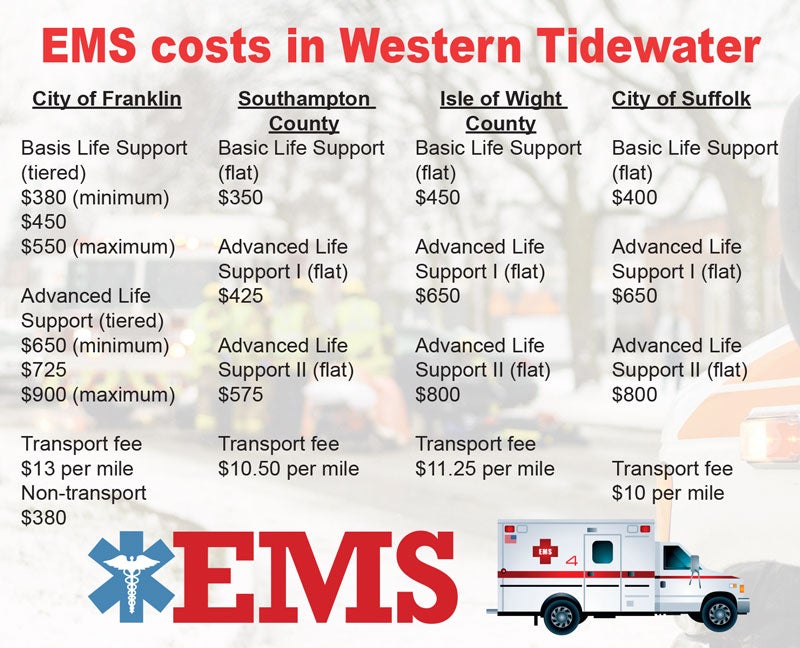City’s EMS rates modified
Published 7:47 pm Tuesday, May 21, 2019

- The Tidewater News compared the city of Franklin's new tiered EMS rates to the flat rates used by surrounding localities.
FRANKLIN
Franklin’s City Council voted unanimously in late February to modify the city’s EMS fees for the second time in less than a year. The city has now implemented a tier system, which begins at $380, goes to $450 and then to a maximum of $550 for basic life support, depending on what services the city’s EMS and fire personnel must provide. For advanced life support, the minimum charge is now $650, and can rise to either $725 or the new maximum of $900 depending on what treatment is provided. The city’s per-mile ambulance transport fee remains at $13 per mile and its fee for treatment without transport — defined as when EMS personnel provide medical treatment to someone who, once treated, declines to be transported to the hospital — remains at $380.
Interim Emergency Services Chief Mark Carr said at the February council meeting that the latest revised rates would make Franklin more in line with the national average for EMS fees. The last time the city’s EMS department requested a rate increase was in April 2018. Then-Chief Vince Holt, who is now retired, told the council at the time that the fees he had proposed for 2018 would make the city more in line with neighboring localities, and fund a salary increase for the city’s EMTs.
The city’s new minimum charge for basic life support remains $20 below that of Suffolk, which charges a flat $400 fee, and $70 below Isle of Wight County, which charges a flat $450 fee. However, it is now $30 higher than the flat $350 fee Southampton County charges. Its maximum basic life support fee is $150 higher than Suffolk’s flat fee, $100 higher than Isle of Wight’s flat fee, and $200 higher than Southampton County’s flat fee.
The city’s new minimum charge for advanced life support is now the same as what Suffolk and Isle of Wight charge for advanced life support I, both of which list a flat rate of $650, and $225 higher than Southampton County’s flat $425 rate. Its maximum charge for advanced life support is now $100 higher than that of Suffolk’s or Isle of Wight’s flat rate for advanced life support II, both of which charge $800; and $325 higher than Southampton, which charges $575.
As for the transport fee, Suffolk charges $10 per mile, Southampton charges $10.50 and Isle of Wight charges $11.25, making Franklin’s $13 rate the highest of the four localities.
Diana Klink, public information officer for the City of Suffolk, and Mike Johnson, Southampton County Administrator, both confirmed that each of their respective localities still use flat rates rather than tiered like Franklin and that neither currently bills for “treatment without transport.” Johnson, however, said that he expects the Southampton County Board of Supervisors to review the matter later this year since it has been 10 years since the county’s EMS rates were last updated.
That said, City Manager Amanda Jarratt confirmed that the new rates do not impact the city’s annual EMS subscription program. City residents can still pay a flat $60 subscription to cover all EMS costs for everyone in their households for one year. Suffolk, Isle of Wight County and Southampton County also offer this, the cost of which is also around $60.
When asked why the city had chosen to raise its rates for the second time in less than a year, Jarratt said that part of the reason was exactly what Carr had told the Council: That the city’s rates, despite the 2018 increase, were still below the national average for a locality of Franklin’s size and call volume. However, she added that another reason was that Holt’s 2018 recommendation had been based on incorrect information the chief had obtained from the city’s website.
The city manager explained that as of 2018, the city’s website was still displaying rates that had not been in use since before 2012. These listed $300 for basic life support, $400 for advanced life support I, $575 for advanced life support II and $8.25 per mile. In 2012, according to the city’s adopted budget for that year, the city had increased these to $450 for basic, $550 for advanced I, $800 for advanced II and $13 per mile.
“This situation has allowed us to improve internal communication among city departments,” Jarratt said. “Unfortunately, our website needs attention when it comes to updating city codes. City departments and citizens should be able to go to the website and obtain a current city code, and that, unfortunately, is not the case.”
She added that the adopted 2018 rates were never communicated to the city’s third-party EMS billing service, MARS/AMB (Medical Accounts Receivable Systems/Ambulance Medical Billing). As a result of this oversight, no revenues were collected for the new treatment without transport billing category from May 1, 2018 through Jan. 31, 2019, according to a spreadsheet included in the City Council’s Jan. 28, 2019 meeting agenda.
The spreadsheet, which Jarratt said was prepared by Interim Finance Director Tracy Spence, also indicated that during the aforementioned time period, MARS/AMB had billed $550 instead of $450 for “basic life support – emergency transport” a total of 450 times. But Jarratt explained that this was simply a typo rather than evidence of overcharging. The spreadsheet should have listed $450 as what MARS/AMB billed in each of these instances, she confirmed.
The revenue anticipated from the 2018 rates and new “treatment without transport” fee, according to the city’s adopted 2018-2019 budget, was listed at $485,000. However, this too, according to Jarratt, was inaccurate.
“[Former City Manager R. Randy] Martin’s revenue projection as not based on actual historical call volume,” Jarratt said. “He put a higher number on the revenue side. What we’re doing moving forward is basing it on actual call volume.”
The overestimated EMS revenue projection, coupled with the fact that the 2018 rates were never communicated to MARS/AMB, according to Jarratt, resulted in an anticipated budget shortfall of roughly $145,000. To cover this shortfall, Jarratt instructed all city departments in February, including Fire and Rescue, to make internal cuts to the remainder of their budgets for fiscal year 2018-2019.
“We put some rescue equipment we were looking to replace on hold,” Carr said.
Jarratt added that most of the cuts were similar deferrals of equipment and office supply purchases.





